MANDATE
The overall goal of the McGill Global Health Programs Executive Council (Executive Council) is to create and help implement a new, comprehensive strategy for global health within the Faculty of Medicine and Health Sciences.
In order to achieve this goal, the Executive Council will be a mechanism for a diverse group of individuals to collaborate, debate and create a vision for the future of global health within the Faculty of Medicine and Health Sciences. The members will sit on the Executive Council for a three year, renewable term.
ROLES & RESPONSIBILITIES
The Executive Council will function as fora for exchange of ideas and issues, ensuring communication with each other and with external partners. They will be responsible for crafting the strategic vision for GHP and identifying opportunities for the future development for global health related research, teaching and service to McGill and its affiliated communities.
In addition to examining approaches and opportunities, the Executive Council will focus on strategic cross-collaborative initiatives between the Faculty of Medicine and Health Sciences as well as other disciplines within the University.
Tasha Ayinde, MPPPA
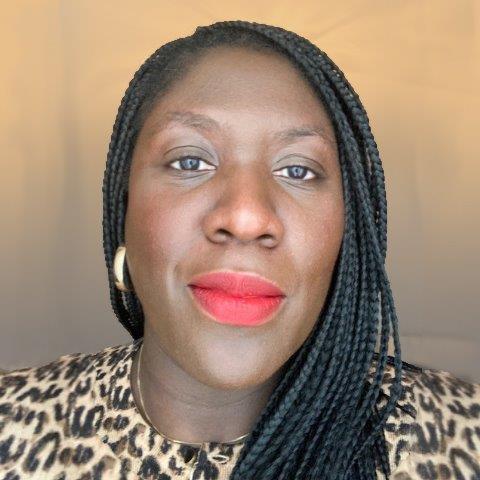 Tasha Ayinde holds the position of Director of Administration and Operations for the School of Population and Global Health (SPGH) and Administrative Excellence Centre 3 (AEC 3) within the Faculty of Medicine and Health Sciences (FMHS). A graduate of Simon Fraser University, British Columbia and McGill University, Montreal, Ms. Ayinde also holds a Master of Public Policy and Public Administration degree from Concordia University. Her research and professional interests include health policy, organizational development, issues related to governance and program evaluation.
Tasha Ayinde holds the position of Director of Administration and Operations for the School of Population and Global Health (SPGH) and Administrative Excellence Centre 3 (AEC 3) within the Faculty of Medicine and Health Sciences (FMHS). A graduate of Simon Fraser University, British Columbia and McGill University, Montreal, Ms. Ayinde also holds a Master of Public Policy and Public Administration degree from Concordia University. Her research and professional interests include health policy, organizational development, issues related to governance and program evaluation.
With an extensive experience spanning two decades in higher education, Tasha has taken on various leadership roles. Prior to joining McGill University, she worked as a human resource consultant in her own firm, servicing public and private organizations and held management positions within the British Columbia provincial government, private sector and not-for-profit groups. She is has played an integral role in the start-up of a number of entities including the McGill Interdisciplinary Initiative in Infection and Immunity and the COVID-19 Immunity Task Force Secretariat.
Ms. Ayinde has actively engaged in steering committees and has made contributions to the FMHS Think Dangerously Strategic Planning Initiative, Family Medicine Task Force, and the Dean of Medicine Global Health Task Force. Beyond McGill, she holds leadership roles as the University Liaison for the Canadian Association for Global Health and Chair of the Global Health Network of the Association of Faculties of Medicine of Canada since April 2022.
Email: tasha.ayindeATmcgill.ca
Shashika Bandara
 Shashika Bandara is a doctoral candidate focusing on global health policy and governance at the Department of Family Medicine, McGill University. Shashika completed his undergraduate degree focusing on molecular biology and English literature at Saint John’s University, MN, USA. Following his undergraduate degree, he conducted cancer immunology research at Johns Hopkins University. He also holds a masters in global health from Duke University and was a policy associate at the Center for Policy Impact in Global Health at the Duke Global Health Institute. Shashika has experience in working on human rights policy advocacy in South Asia with Law and Society Trust, Sri Lanka and on disaster response in post-conflict zones of Sri Lanka with CARE International.
Shashika Bandara is a doctoral candidate focusing on global health policy and governance at the Department of Family Medicine, McGill University. Shashika completed his undergraduate degree focusing on molecular biology and English literature at Saint John’s University, MN, USA. Following his undergraduate degree, he conducted cancer immunology research at Johns Hopkins University. He also holds a masters in global health from Duke University and was a policy associate at the Center for Policy Impact in Global Health at the Duke Global Health Institute. Shashika has experience in working on human rights policy advocacy in South Asia with Law and Society Trust, Sri Lanka and on disaster response in post-conflict zones of Sri Lanka with CARE International.
Shashika’s doctoral research focuses on the implementation challenges of the Framework Convention of Tobacco Control in low- and middle-income countries. He is a Vanier scholar and a past editor-in-chief of McGill Global Health Perspectives.
Dan Deckelbaum, MD, CM, FRCSC, MPH
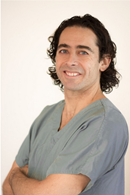 Dan Deckelbaum is assistant professor at the Divisions of Trauma and General Surgery at the McGill University Health Centre (MUHC), associate member of the Department of Epidemiology, biostatistics and occupational health at McGill University, and honorary associate professor of the National University of Rwanda. He obtained his subspecialty training in trauma surgery and critical care at Jackson Memorial Hospital in Miami. During his fellowship, he also completed a Masters of Public Health at the University of Miami.
Dan Deckelbaum is assistant professor at the Divisions of Trauma and General Surgery at the McGill University Health Centre (MUHC), associate member of the Department of Epidemiology, biostatistics and occupational health at McGill University, and honorary associate professor of the National University of Rwanda. He obtained his subspecialty training in trauma surgery and critical care at Jackson Memorial Hospital in Miami. During his fellowship, he also completed a Masters of Public Health at the University of Miami.
In addition to his passion for clinical practice, he has developed an avid interest in global surgical education and development, as well as disaster preparedness and response, establishing and co-directing the MUHC Centre for Global Surgery. His interest in global health is founded upon on-site clinical experience in government hospitals in East Africa as well as disaster response activities in Somalia, Kenya, Turks and Caicos, and Haiti. This clinical experience is the basis for ongoing capacity building programs in resource limited settings across the globe. This includes education programs in resource limited setting.
Email: dan.deckelbaumATmcgill.ca
Matthew Hunt, PT, PhD
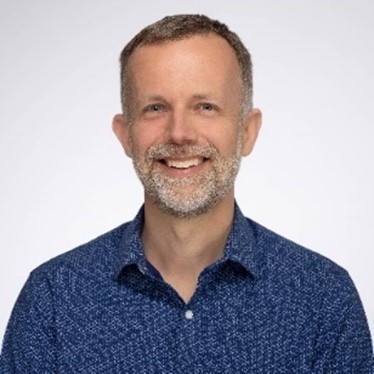 Matthew Hunt is a Professor at McGill University’s School of Physical and Occupational Therapy, and a researcher at the Centre for Research on Ethics and the Centre for Interdisciplinary Research in Rehabilitation. He directs the ethics axis of the Quebec Population Health Research Network and is a faculty lead for the School of Physical and Occupational Therapy’s Global Health Rehabilitation Initiative. Matthew conducts research at the intersections of ethics, rehabilitation, and humanitarian action, and co-leads the Humanitarian Health Ethics Research Group (humanitarianhealthethics.net) and the Levier living laboratory in rehabilitation ethics.
Matthew Hunt is a Professor at McGill University’s School of Physical and Occupational Therapy, and a researcher at the Centre for Research on Ethics and the Centre for Interdisciplinary Research in Rehabilitation. He directs the ethics axis of the Quebec Population Health Research Network and is a faculty lead for the School of Physical and Occupational Therapy’s Global Health Rehabilitation Initiative. Matthew conducts research at the intersections of ethics, rehabilitation, and humanitarian action, and co-leads the Humanitarian Health Ethics Research Group (humanitarianhealthethics.net) and the Levier living laboratory in rehabilitation ethics.
Email: matthew.hunt1ATmcgill.ca
About Pr. HuntJosée Lavallée, BScN, RN, MSc
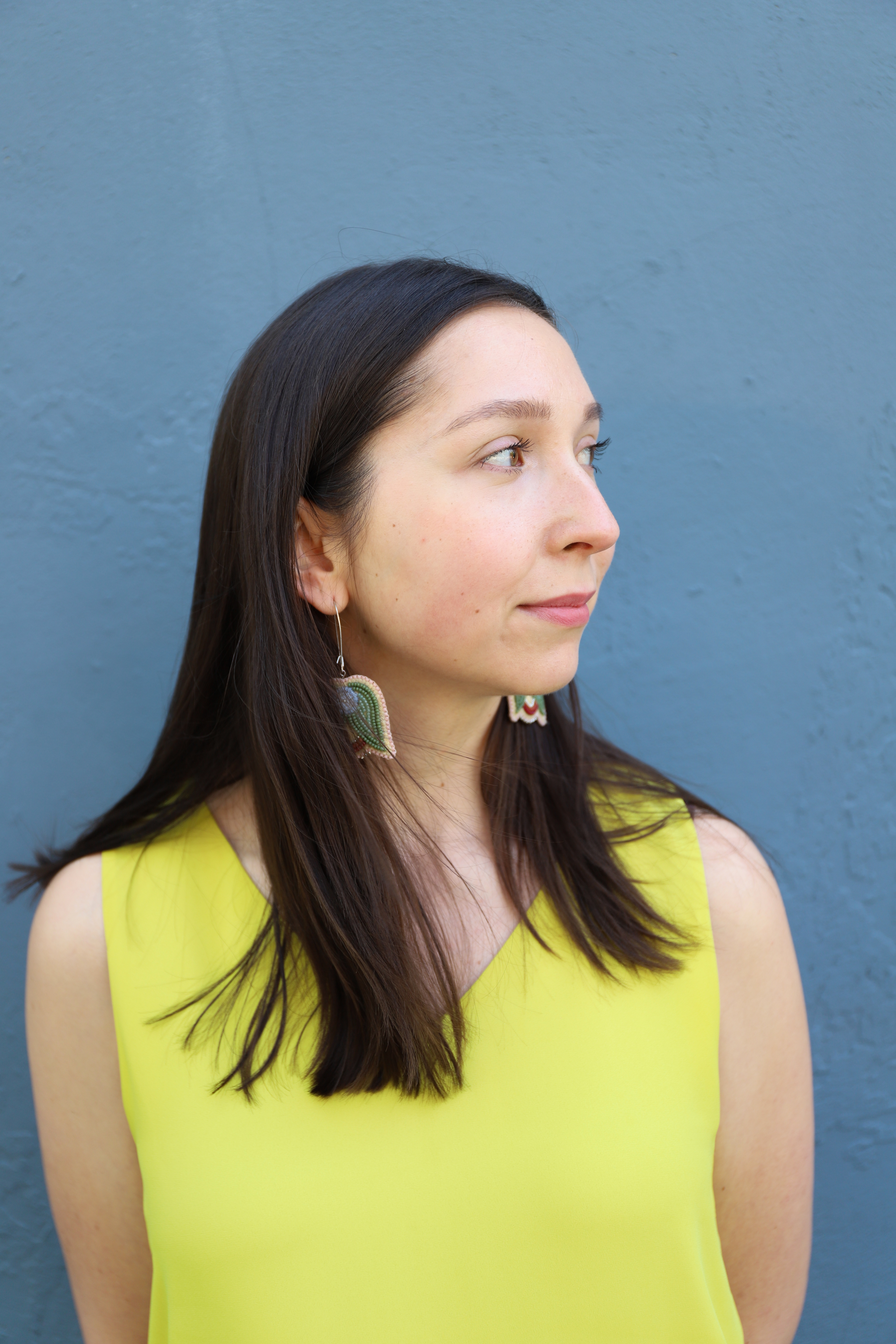 Josée Lavallée (she/her) is Red River Michif and member of the Manitoba Métis Federation’s Bison Local. She obtained a Baccalauréat en Sciences Infirmières (BScN) from Université de Saint-Boniface. Josée has spent most of her clinical career in community health and advocating for culturally safe, anti-racist, and anti-oppressive nursing practice and education. Josée has a Master of Science in Community Health Sciences (MSc) from the University in Manitoba where she explored the interrelated nature of Red River Métis culture and health. Josée is the inaugural Director of the Office of Social Accountability in Nursing (OSAN) in the Ingram School of Nursing. Under the direction of Ms. Lavallée, the OSAN will support equity-based nursing education, leadership, service and research at the ISoN as well as serve as an umbrella for the Global and Indigenous Health Nursing and the Equity, Anti-Racism, Anti-Oppression, and Decolonization activities of the School. The Office will act as a resource to various ISoN committees, working collaboratively with faculty and staff on processes and programs, including recruitment and admission of students, and recruitment of faculty.
Josée Lavallée (she/her) is Red River Michif and member of the Manitoba Métis Federation’s Bison Local. She obtained a Baccalauréat en Sciences Infirmières (BScN) from Université de Saint-Boniface. Josée has spent most of her clinical career in community health and advocating for culturally safe, anti-racist, and anti-oppressive nursing practice and education. Josée has a Master of Science in Community Health Sciences (MSc) from the University in Manitoba where she explored the interrelated nature of Red River Métis culture and health. Josée is the inaugural Director of the Office of Social Accountability in Nursing (OSAN) in the Ingram School of Nursing. Under the direction of Ms. Lavallée, the OSAN will support equity-based nursing education, leadership, service and research at the ISoN as well as serve as an umbrella for the Global and Indigenous Health Nursing and the Equity, Anti-Racism, Anti-Oppression, and Decolonization activities of the School. The Office will act as a resource to various ISoN committees, working collaboratively with faculty and staff on processes and programs, including recruitment and admission of students, and recruitment of faculty.
Isabel Muñoz Beaulieu, BA (Hons)
 Isabel Muñoz Beaulieu is an MSc student at McGill’s Department of Family Medicine. At McGill, she has also completed a joint honors BA in International Development Studies and Philosophy. Isabel’s research interests focus on issues in humanitarian aid, global health ethics, and health systems and policy. Isabel has conducted research in humanitarian health ethics under the Institute of Health and Social Policy and as a Global Health Scholar. She is a member of the Humanitarian Health Ethics Research Group and has collaborated with organizations like the Center for Disaster Preparedness and the Canadian Red Cross. In addition, Isabel has gained practical experience working in the humanitarian and development field with the United Nations High Commissioner of Refugees in Guatemala and The Hunger Project. Isabel is a member of the health equity committee at Women’s College Hospital Institute for Health System Solutions and Virtual Care, where she works as a casual research assistant. She is one of the program coordinators for McGill’s chapter of the Canadian Association for Global Health and an executive member of the Family Medicine Graduate Student Society. Isabel’s research is supported by a Master’s Canada Graduate Scholarship with the Social Sciences and Humanities Research Council.
Isabel Muñoz Beaulieu is an MSc student at McGill’s Department of Family Medicine. At McGill, she has also completed a joint honors BA in International Development Studies and Philosophy. Isabel’s research interests focus on issues in humanitarian aid, global health ethics, and health systems and policy. Isabel has conducted research in humanitarian health ethics under the Institute of Health and Social Policy and as a Global Health Scholar. She is a member of the Humanitarian Health Ethics Research Group and has collaborated with organizations like the Center for Disaster Preparedness and the Canadian Red Cross. In addition, Isabel has gained practical experience working in the humanitarian and development field with the United Nations High Commissioner of Refugees in Guatemala and The Hunger Project. Isabel is a member of the health equity committee at Women’s College Hospital Institute for Health System Solutions and Virtual Care, where she works as a casual research assistant. She is one of the program coordinators for McGill’s chapter of the Canadian Association for Global Health and an executive member of the Family Medicine Graduate Student Society. Isabel’s research is supported by a Master’s Canada Graduate Scholarship with the Social Sciences and Humanities Research Council.
Charles Larson, MD, MSc
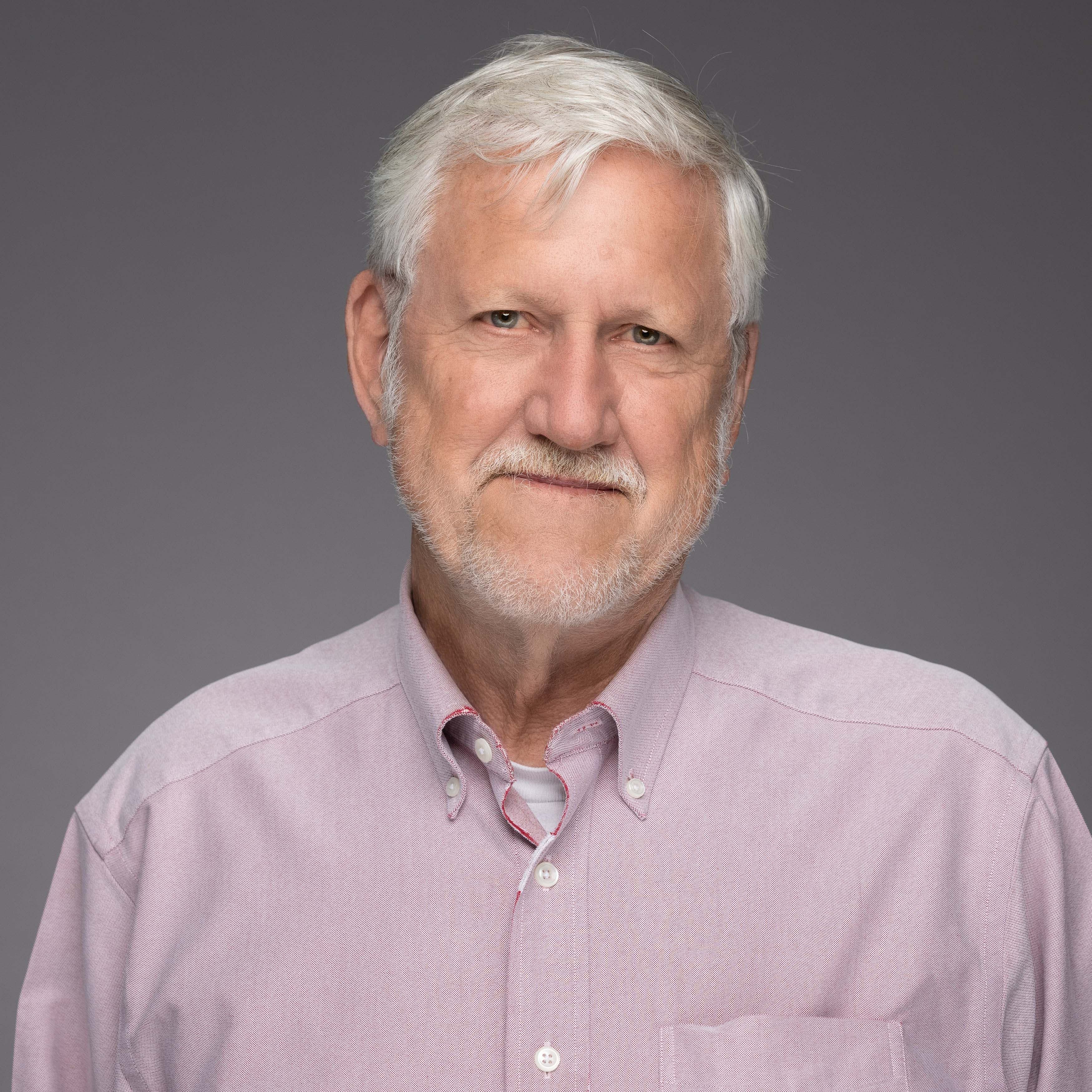 Charles Larson completed his medical degree and subsequent specializations in Pediatrics and Preventive Medicine & Public Health at McGill University. As a medical student, he was a co-founder of the Pointe St Charles Community Health Centre, precursor to Quebec's local community clinic system of primary care. In many ways, this was his introduction to global health and his eventual career path. His actual global health career began in 1987 when he joined the McGill-Ethiopia Strengthening Community Health Project, which he directed from 1989 to 1992. Dr. Larson then returned to McGill as an Associate Professor in the Departments of Pediatrics and Epidemiology, Biostatistics and Occupational Health (EBOH). He also headed the McGill Global Health Office within the Faculty of Medicine and led a five year McGill population child health project in Chelyabinsk Russia. In 2002 Dr. Larson moved to Bangladesh where, on secondment from McGill, he directed the Health Systems and Infectious Diseases Division at the International Centre for Diarrheal Diseases Research, Bangladesh (icddr,b), In 2008 Dr. Larson returned to Canada, joining the Department of Pediatrics at the University of British Columbia as Professor and Director of the UBC-BC Children's Hospital Centre for International Child Health (CICH). In 2015, Dr. Larson returned to Montreal at which time he assumed the role of National Coordinator of the Canadian Coalition for Global Health Research (CCGHR) until it merged to become the Canadian Association for Global Health (CAGH). At the same time, he joined the Departments of Epidemiology, Biostatistics and Occupational Health (EBOH) and of Pediatrics as an Adjunct Professor, and McGill Global Health Programs, for which he served as Director until January 2024. Dr. Larson’s interests focus on capacity building and in development or delivery research in support of the scale-up of life-saving interventions in under-five children.
Charles Larson completed his medical degree and subsequent specializations in Pediatrics and Preventive Medicine & Public Health at McGill University. As a medical student, he was a co-founder of the Pointe St Charles Community Health Centre, precursor to Quebec's local community clinic system of primary care. In many ways, this was his introduction to global health and his eventual career path. His actual global health career began in 1987 when he joined the McGill-Ethiopia Strengthening Community Health Project, which he directed from 1989 to 1992. Dr. Larson then returned to McGill as an Associate Professor in the Departments of Pediatrics and Epidemiology, Biostatistics and Occupational Health (EBOH). He also headed the McGill Global Health Office within the Faculty of Medicine and led a five year McGill population child health project in Chelyabinsk Russia. In 2002 Dr. Larson moved to Bangladesh where, on secondment from McGill, he directed the Health Systems and Infectious Diseases Division at the International Centre for Diarrheal Diseases Research, Bangladesh (icddr,b), In 2008 Dr. Larson returned to Canada, joining the Department of Pediatrics at the University of British Columbia as Professor and Director of the UBC-BC Children's Hospital Centre for International Child Health (CICH). In 2015, Dr. Larson returned to Montreal at which time he assumed the role of National Coordinator of the Canadian Coalition for Global Health Research (CCGHR) until it merged to become the Canadian Association for Global Health (CAGH). At the same time, he joined the Departments of Epidemiology, Biostatistics and Occupational Health (EBOH) and of Pediatrics as an Adjunct Professor, and McGill Global Health Programs, for which he served as Director until January 2024. Dr. Larson’s interests focus on capacity building and in development or delivery research in support of the scale-up of life-saving interventions in under-five children.
Email: charles.larsonATmcgill.ca
Riya Sawhney, MBChB MSc (c)
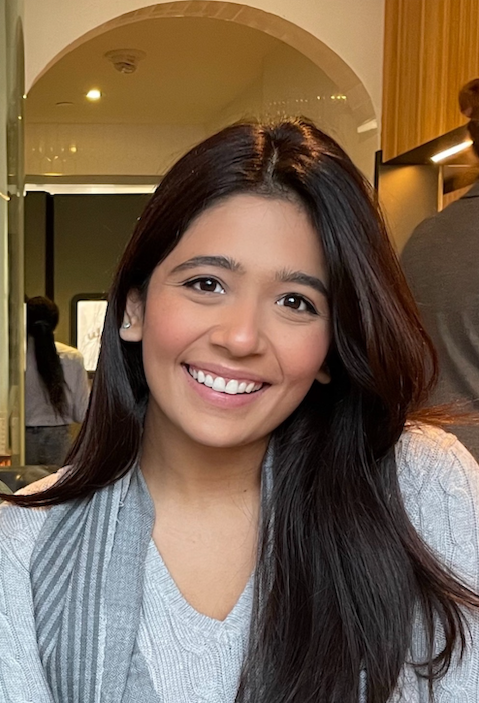 Riya Sawhney is a graduate student and Jean-Martin Laberge Fellow in Global Paediatric Surgery at McGill University. Riya has keen research interests in global health and global surgery, surgical education and innovation, diversity, and equity. Currently, she serves as the Chair of the Gender Equity Initiative in Global Surgery (GEIGS) and Student Lead of the Association of Academic Global Surgery’s Advocacy Committee. She is a former Vice Chair of InciSioN UK and a Royal College of Surgeons of England prize winner for her elective in global surgery. Riya also continues to be a Global Surgery Research Fellow with the WHO collaborating center for surgical care delivery in low- and middle-income countries, India. Prior to this, she worked as a Foundation Doctor in North West England after graduating from the University of Leeds School of Medicine in 2020, where she was President of the university’s student surgical society, and International Students Representative on the Medical Students Representative Council (MSRC).
Riya Sawhney is a graduate student and Jean-Martin Laberge Fellow in Global Paediatric Surgery at McGill University. Riya has keen research interests in global health and global surgery, surgical education and innovation, diversity, and equity. Currently, she serves as the Chair of the Gender Equity Initiative in Global Surgery (GEIGS) and Student Lead of the Association of Academic Global Surgery’s Advocacy Committee. She is a former Vice Chair of InciSioN UK and a Royal College of Surgeons of England prize winner for her elective in global surgery. Riya also continues to be a Global Surgery Research Fellow with the WHO collaborating center for surgical care delivery in low- and middle-income countries, India. Prior to this, she worked as a Foundation Doctor in North West England after graduating from the University of Leeds School of Medicine in 2020, where she was President of the university’s student surgical society, and International Students Representative on the Medical Students Representative Council (MSRC).
Erwin Schurr, PhD
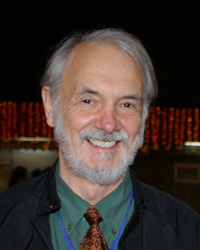 Erwin Schurr obtained his Ph.D. from the Institute of Biophysics and Radiation Biology at the Albert-Ludwigs University in Freiburg/Br, Germany. He then did his postdoctoral studies in molecular genetics with E. Skamene and P. Gros at McGill University. In 1991, he joined the McGill Centre for the Study of Host Resistance and the Faculty of Medicine and Health Sciences at McGill as Assistant Professor. Since 2018, he is a Distinguished James McGill Professor of Human Genetics and Medicine at McGill University. At the Research Institute of the McGill University Health Centre, he is a member of the program on Infectious Diseases and Immunity in Global Health. His main research interest is the identification of host genetic factors predisposing to tuberculosis and leprosy; research that is supported by both national and international funding agencies. He has published extensively on the identification of genetic host susceptibility factors in both leprosy and tuberculosis. As part of this research, he has engaged in numerous studies with colleagues from institutes in LMIC for genetic epidemiological studies of tuberculosis and leprosy.
Erwin Schurr obtained his Ph.D. from the Institute of Biophysics and Radiation Biology at the Albert-Ludwigs University in Freiburg/Br, Germany. He then did his postdoctoral studies in molecular genetics with E. Skamene and P. Gros at McGill University. In 1991, he joined the McGill Centre for the Study of Host Resistance and the Faculty of Medicine and Health Sciences at McGill as Assistant Professor. Since 2018, he is a Distinguished James McGill Professor of Human Genetics and Medicine at McGill University. At the Research Institute of the McGill University Health Centre, he is a member of the program on Infectious Diseases and Immunity in Global Health. His main research interest is the identification of host genetic factors predisposing to tuberculosis and leprosy; research that is supported by both national and international funding agencies. He has published extensively on the identification of genetic host susceptibility factors in both leprosy and tuberculosis. As part of this research, he has engaged in numerous studies with colleagues from institutes in LMIC for genetic epidemiological studies of tuberculosis and leprosy.
Email: erwin.schurrATmcgill.ca
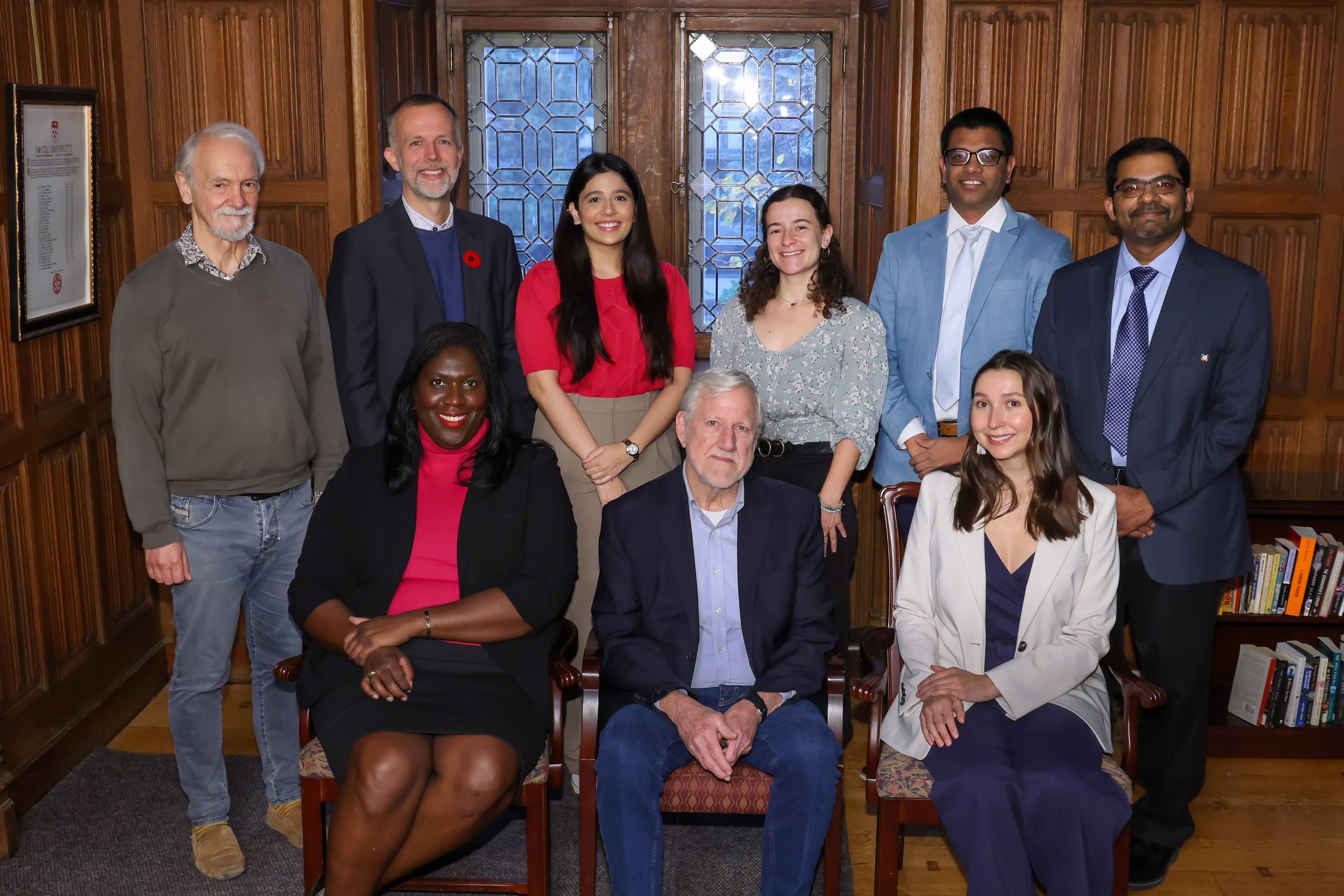
The McGill GHP Executive Council in 2023. Not pictured: Dr. Dan Deckelbaum. Photo Credit: Owen Egan and Joni Dufour for McGill University.

